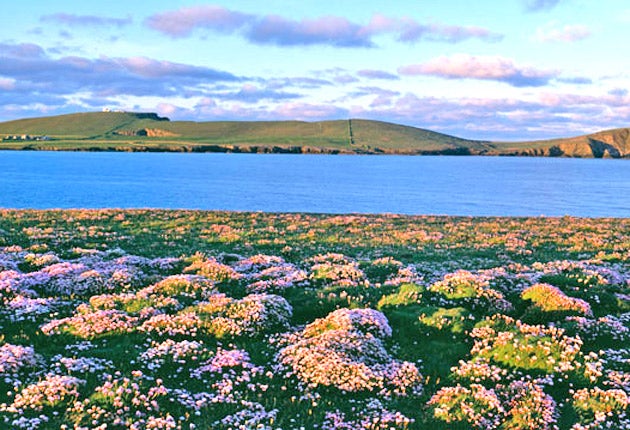Government to buck global trend for ban on deep-sea oil drilling

Ministers faced demands last night to block plans by BP to launch a deep-sea drilling operation in the North Sea.
The embattled oil company is due to start exploring 60 miles off the Shetland Isles in October, at a time when governments around the world are showing increasing caution about deep-sea drilling following the Gulf of Mexico disaster, the worst oil spill in history.
Barack Obama has ordered a moratorium on deep-sea drilling, and with BP also due to start exploring for oil and gas in the Mediterranean Sea off Libya within weeks, clamour is growing within the EU for a temporary ban on deep-sea drilling. The EU's energy commissioner, Günther Oettinger, describes a moratorium as the "right approach for potentially dangerous drilling... in light of the risk exposed by the Deepwater Horizon spill", and the Italian Environment minister, Stefania Prestigiacomo, said the plans in the Med "give rise to serious concern". But the Government made clear yesterday it would not veto the Shetland scheme, arguing that tough safety rules would prevent a repeat of the environmental catastrophe triggered by the Deepwater Horizon explosion. Campaigners claim that ministers are acting as if the the Gulf spill had never happened.
Questions were also raised over the advice the Treasury has been receiving from Tim Eggar, a former director of several oil companies who has been advising the Chancellor George Osborne on changing the tax regime for oil and sea gas exploration in the North Sea. Mr Eggar, a former Tory energy minister, was brought on board by Mr Osborne while in opposition to review the tax treatment of energy companies.
According to Freedom of Information replies obtained by Greenpeace, on 26 May Mr Eggar met the Treasury minister, Justine Greening, and held a further meeting with government officials on 3 June.
New tax rules that Greenpeace claim would make it more financially attractive to explore deep oil fields were announced on 29 July. Greenpeace accused the Treasury of "caving in" to pressure from the oil industry. Joss Garman, an energy campaigner for the pressure group, said: "A Gulf-style blowout at BP's deepest British drill site would be a political disaster for David Cameron, but more importantly it would be a catastrophe for the fragile habitat off Scotland's coast and a threat to the country's economic recovery. We need to follow Obama's lead and introduce a moratorium on deepwater drilling."
But the Treasury rebutted Greenpeace's interpretation of the new tax regime, saying it mainly applied to shallower oil fields, and adding that it had been planned by the previous government. A spokesman said: "It was proposed by Alistair Darling [the then Chancellor]. The previous government was going to put it in place and the [coalition] Government has done that."
The spokesman denied that there was any significance to the Eggar meeting, adding: "Ministers meet lots of different people all the time."
On the Shetland planned deep-sea drilling, a spokeswoman for the Department of Energy and Climate Change said: "We will not consent to the drilling of any well unless we are convinced that it is designed to the very highest standards, that the equipment used is fully tested and that the people working on the well are fully trained.
"We are not complacent and while our safety and environmental regimes are first-rate, we have nevertheless decided that we should double the number of inspections of mobile rigs to ensure that what companies say they are doing is actually what they are doing."
Tim Eggar: The Tories' friendly oil man
During his time in government, Mr Eggar was on the liberal wing of the Conservative Party and rose through the ranks, despite his private reservations about Margaret Thatcher. But what people remember about him is something he would have preferred them to forget.
One day, the minister was outraged to see two girls, aged 11 and six, picking flowers from his unfenced front garden. He marched them both inside his house to deliver a lecture. Later, he was confronted by the father of the six-year-old, who headbutted him and left him with a black eye and a broken tooth. The judge let the assailant off with a suspended sentence but condemned Mr Eggar's actions.
As Energy Minister in 1992-96, he signed an order to scuttle the 14,500-tonne oil installation Brent Spar and let it sink. The plan was abandoned after a vociferous protest by Greenpeace. In 1997, after 18 years in Parliament, the public school and Cambridge-educated Mr Eggar chose not to defend his seat in Enfield North, which he would have lost anyway in the Labour landslide.
His previous career had been in banking, but now he went into the energy business, serving as a director at a number of oil companies, including Indago Petroleum, Agip UK and Expro International. He was also chief executive of Monument Oil and Gas and a non-executive director of Lasmo. Since 2007 he has been the chairman of Nitol Solar, a Russian solar energy company. In February this year George Osborne invited him to lead a review of the tax treatment of the North Sea oil and gas industry.
Subscribe to Independent Premium to bookmark this article
Want to bookmark your favourite articles and stories to read or reference later? Start your Independent Premium subscription today.

Join our commenting forum
Join thought-provoking conversations, follow other Independent readers and see their replies